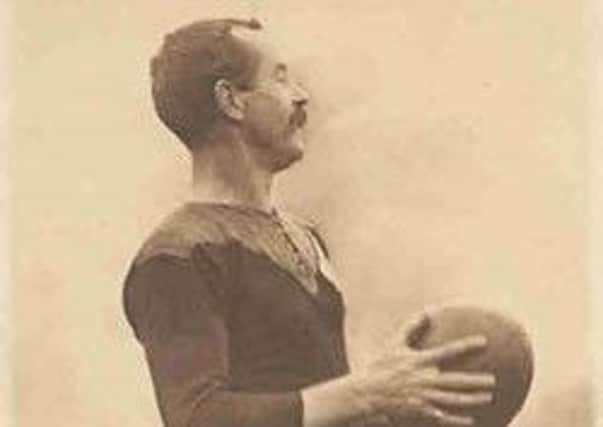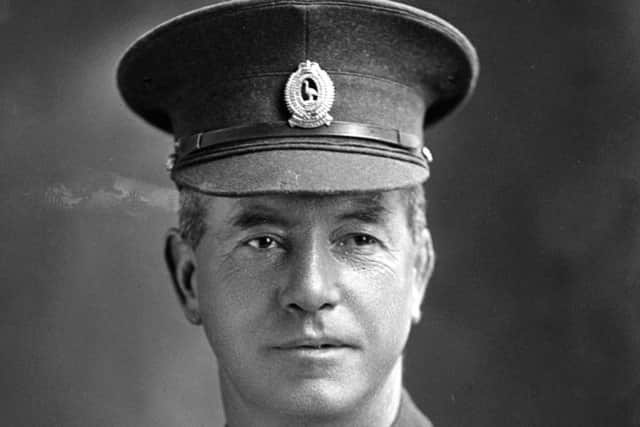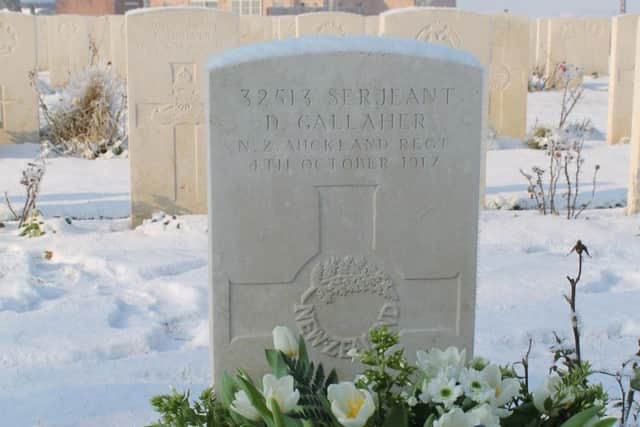David Gallaher, a leader of men on both sporting field and battlefield


David Gallaher was born on October 30 1873 in Ramelton, Co Donegal, and baptised in First Ramelton Meeting House on January 8 1874, and in May 1878 his family sailed from Belfast on the Lady Jocelyn to make a new life for themselves in New Zealand.
The family name was actually Gallagher but the New Zealand immigration officials in Auckland mis-spelled the name.
Advertisement
Hide AdAdvertisement
Hide AdThe family originally settled in Katikati, a settlement founded by George Vesey Stewart of Martray, Co Tyrone, in 1874, which might be justly regarded as ‘an Ulster plantation in New Zealand’. Part of Vesey Stewart’s sales pitch for the new settlement was its Ulster and Orange character. In the words of one Robert Stuart: ‘Be you an Orangeman, you shall meet Orangemen; be you a Blackman, you shall meet Blackmen; be you a Freemason, you shall meet Freemasons; be you what you may, you shall always meet a hearty welcome … from honest and contented countrymen’.


John Hamilton, another settler, identified another appealing feature of life in Katikati. He thanked Stewart for bringing him to a land ‘where a man can live under his own vine and fig tree’ and without ‘fear of landlord, agent or bailiff’.
The Gallaher family subsequently moved to Auckland in the 1890s and it was here that Gallaher began to play provincial rugby. He played 26 representative matches for Auckland.
Gallaher was the captain of the Original All Blacks (often simply referred to as ‘The Originals’), New Zealand’s first national rugby union team to tour outside Australasia. He captained the team from 1903 to 1906. The legendary All Blacks five-month tour of Britain in 1905 constitutes the highlight of his career. The All Blacks scored 976 points and conceded only 59 in 35 matches. They won 34 matches and lost only one against Wales and controversy still surrounds the referee’s decision that cost them the match. ‘The Originals’ certainly set a very high standard for all subsequent All Black sides to emulate.
Advertisement
Hide AdAdvertisement
Hide AdGallaher was one of rugby’s greatest strategists. At the conclusion of the tour Gallaher and his friend and fellow player J W (‘Billy’) Stead wrote ‘The Complete Rugby Footballer’, a 300-page master class in rugby. It is still widely regarded as ‘the most exhaustive and finest written exposition of the rugby game that has yet been printed’.


Gallaher served in the Boer War in the 6th and 10th New Zealand Mounted Rifles. To do so, he shaved three years of his age to serve.
Although exempt from conscription due to his age, Gallaher enlisted to serve in the Great War in May 1916. Some have alleged that Gallaher joined up to avenge the death of Sergeant-Major D W Gallaher, a younger brother, who was killed serving with the Australians at Fromelles in June 1916. Chronology demonstrates that this is not so.
Matt Elliott, Gallaher’s most recent biographer, is almost certainly correct in attributing his enlistment to ‘loyalty and duty’. No part of the British Empire was more patriotic or loyal to the Mother Country in the Great War than New Zealand. Although having a population of only 1.1 million, New Zealand sent approximately 10% of its population to war, of whom 18,000 did not return.
Advertisement
Hide AdAdvertisement
Hide AdDave Gallaher was a natural leader of men whether on the rugby pitch or the battlefield. On October 3 1917 during the Third Battle of Ypres Dave Gallaher led the men of the 2nd Auckland Regiment over the top for the last time in the attack on Gravenstafel Spur. A piece of shrapnel smashed through his helmet and he was carried, dying, from the battlefield.


An Irish priest was giving the last rites to a soldier, Edward Fitzgerald, at the No 3 Australian Casualty Clearing Station when he drew Fitzgerald’s attention to a stricken colleague nearby. ‘Do you know who that is, on the next table?’ the padre asked. Fitzgerald shook his head. ‘That is Dave Gallaher, captain of the 1905 All Blacks.’ He died on October 4 and is buried at Nine Elms Cemetery, Poperinge. His headstone states that he was 41 years old. Actually he was almost 44.
Five of the nine Gallaher brothers served during the Great War and three of them died (David, Douglas and Henry).
Gallaher was one of the outstanding sportsmen of his era. As his obituary on the front page of Auckland Star put it: ‘Standing six feet in height, thirteen stone in weight, hard as nails, fast and full of dash, he bolted from the mark every time, played right up to the whistle and stopped for nothing big or small.’
Advertisement
Hide AdAdvertisement
Hide AdThirteen former All Black rugby players were killed in the First World War – one in 10 of those who had worn the black jersey during the previous decade. Four of them were killed within a fortnight in June 1917 when the New Zealand Division took part in the stunningly successful assault on the Messines ridge in which the 36th (Ulster) and 16th (Irish) Divisions also participated.


In recent years All Black teams touring France have paid homage to Gallaher at his Belgian grave. His name lives on in the Gallaher Shield, awarded to the winner of Auckland’s premier club competition since 1922. A more recent trophy, the Dave Gallaher Cup, has since 2000 been held by the winner of the first rugby test between New Zealand and France in each calendar year.
In July 2011 a 2.7 metre bronze statue of Dave Gallaher was unveiled in front of Eden Park Stadium, Auckland – the home of New Zealand rugby.
In October 2015 an All Blacks rugby jersey worn by Dave Gallaher during the 1905 tour was sold for £180,000 at auction in Cardiff. It had been expected to sell for between £20,000 and £40, 000 but such is the legend that was Dave Gallaher.